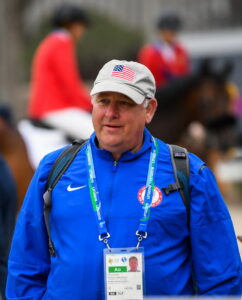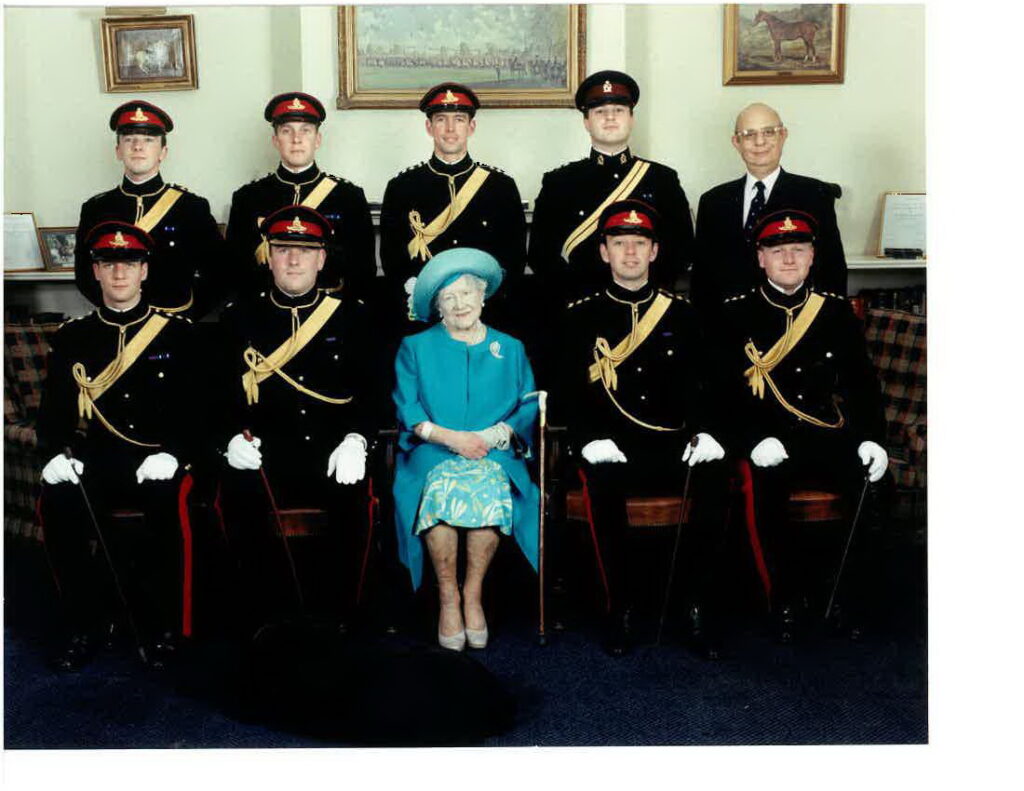The U.S. Equestrian Federation’s dynamic director of sport, Will Connell, is leaving the organization after eight hugely successful years.
“What drives me is trying to find programs and solutions that will grow the pathway, increase performance and everything,” said the native of Great Britain, explaining his decision to take another road.
“You have to give 100 percent. When you start feeling that it’s time for someone else to take the reins, that’s the time for me to move on.”
Will, who is staying with USEF through Nov. 25, will continue living in Gladstone, N.J., with his wife, Lizzy Chesson, the USEF’s managing director of show jumping. She will remain in her post.
Thinking about his time with USEF, he said, “There’s a huge amount I’ll miss. I don’t do this job for the check at the end of the month, even though that’s quite generous.
“I’m sure walking away from a well-paid job in the face of a recession is perhaps not the most intelligent move, but I’ve always been driven by my instincts and I feel that now’s the time. There will be plenty of people out there who can take up the reins and run with it.”
As he reflected about his time in the job, he commented on how much he appreciates those who step up to back the sport.
“The one thing the U.S. has that I don’t think any other country has is the support from the donors and that ability to engender financial support from people who really get nothing out of it, other than liking to see the team win. That is something the U.S. must never lose.”
Other countries’ sports programs, he pointed out, are supported by the government or commercial interests, or lack financial aid entirely.
“When you see the enthusiasm of the (U.S.) donors and how they’ll get behind projects, I wish I had been better at structuring programs they could have gotten behind,” he said wistfully.
He pointed out that “there are some incredibly talented and dedicated people in the U.S. across the whole spectrum,” running from the grooms, coaches, athletes and horse owners to the leaders in the federation.
One of his great achievements was putting the U.S. para dressage program in the spotlight, which paid off with the country’s first team Paralympic medal in Tokyo last year.
So what’s next for Will, who came to the U.S. in 2014 from a job as the British Equestrian Federation’s Performance Director. He had the responsibility for co-ordination and delivery of the UK Sport National Lottery-funded World Class Program, which covered eventing, dressage, showjumping and para dressage. In 2012, HRH the Princess Royal presented him with the Most Excellent Order of the British Empire at Buckingham Palace, in recognition of his service to equestrian sport.
That was a hard act to follow, but he did it when he came to the U.S. Now he’s still thinking about another appropriate move.
“In my ideal world, if I could write the next chapter, there would be four or five or six projects that would be differing in nature but very focused in outcome. You might as well dream big,” he mused.
“Probably within sport, but maybe other areas as well. I think I’m also the sort of person that until I make that jump, I’m not going to force myself to find out what the next step will be.”
He noted that he has yet to rewrite his resume.
“I think it still says, `Just left the army, ’” he laughed.
There can be no doubt that whatever he does will involve some aspect of his leadership experience. While in the British army, he served as commanding officer of the King’s Troop Royal Horse Artillery. In that prestigious position, he oversaw 165 soldiers and 130-plus horses that comprise the ceremonial saluting battery of Her Majesty Queen Elizabeth’s Household Troops.
Combined with his knowledge of elite sport, he noted, “those experiences can shape what I do next in terms of what I deliver.”
He is looking forward to having more time for his family, both here and in Britain, and plans to return to the London International Horse Show, where he works as a volunteer.
Will sees that show as “a beacon, where elite sport meets entertainment. You’ve got sport at the very highest level and you’ve also got entertainment at the highest level. When you can bring those two together, that’s pretty special.”
He’s pleased that the FEI World Cup Finals are going to Ft. Worth, Texas in 2026, a follow up to the dressage, show jumping and vaulting Cup that will be in Omaha for the second time next year.
“I hope they can find that balance between entertainment and sport,” he said.
With the World Championships looming next month, he’s still all-in for helping the U.S. teams in para, dressage and show jumping qualify for the 2024 Paris Paralympics and Olympics with their performances in Herning, Denmark.
Dressage will be interesting, he notes, with the Germans looking to be far from the juggernaut that they usually are in that discipline. Although the Danes are favored for gold, there is plenty of room for other countries to maneuver for the medals.
In jumping, he called the quality of the teams “unbelievable. I don’t think I’ve ever seen a championships or Games with such depth of quality jumping teams.”
The U.S. squad has several young athletes, but he noted, in the big picture, the U.S. show jumping program has done extraordinarily well, and the pride he feels about it was obvious.
“When you look at what the jumping team has achieved since 2012; medals in 2014 (the Normandy world championships), 2016 (the Rio Olympics), 2018 (the Tryon world championships) and ’21(the Tokyo Olympics), the World Cup finals. It’s been incredible. I think it’s had more success than any other team in history, probably, over an eight-year period.”
And he’s optimistic about prospects going forward.
“When you look at what is on the horizon for Paris, it’s very exciting. I would say it’s more exciting now in ’22 looking at ’24 than in ’18 looking at Tokyo. The team is super excited to be going, and that enthusiasm will carry them onto the field of play and they will come together as a team.”
But he also cautioned, “Yes, it’s wonderful to win medals every time you go out, but more important, it’s about having the long game.
“The first stage of Long Term Athlete Development is fundamentals. FUNdamentals. Having fun in sport. While we have great and good governance, we must never lose track of the fact that ultimately and initially, sport should be fun taking activity.”
The USEF will be hiring a new director of sport, and plans call for Will to help that person get established in the job.
In the meantime, CEO Bill Moroney had kind words for the man who is departing.
“Will Connell has provided important leadership and contributed greatly to the success of the U.S. teams since 2015; his accomplishments and contributions are many,” said Bill.
“We support him in his decision and appreciate that he remains completely committed to our efforts to field and support the athletes, their horses, and their support teams for the upcoming World Championships, as well as his continued support of our sport staff team and programs across all the FEI disciplines.”


